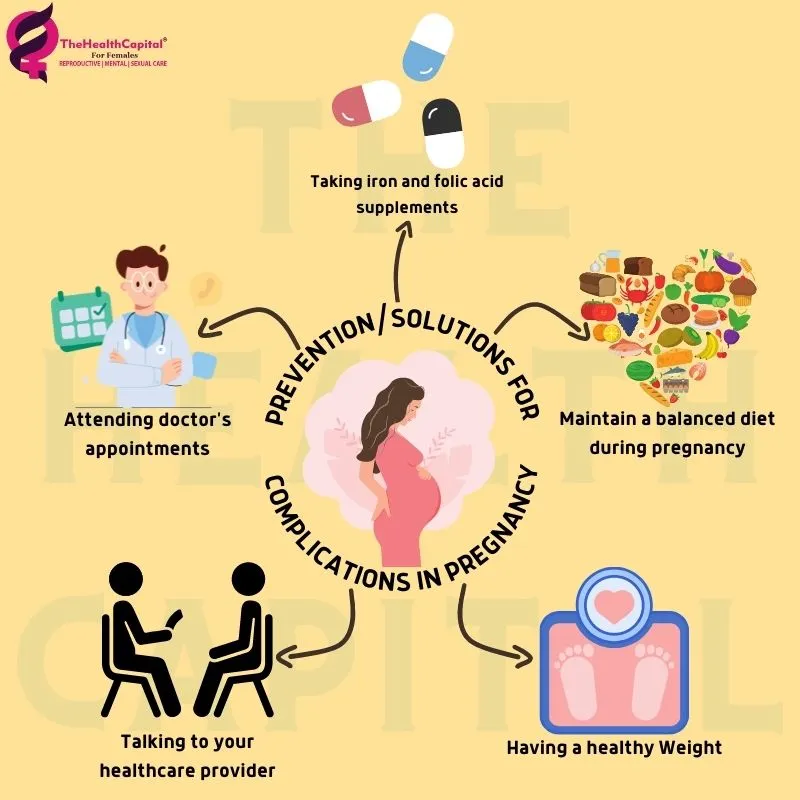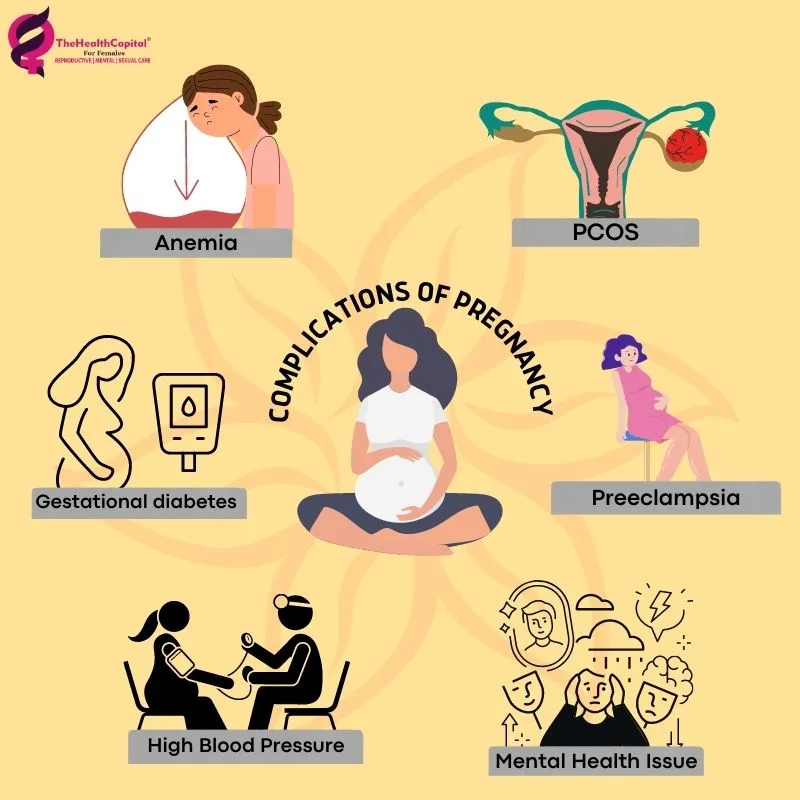An intense study of women who were expecting has shown that 15-20% of all women in India face a high risk of pregnancy issues, which is responsible for 75% of perinatal morbidity and mortality (death of foetus). It becomes necessary to make women aware of this so that they are abreast of the complications that can take place when a woman is pregnant.
“We have a secret in our culture, and it’s not that birth is painful. It’s that women are strong.”
Laura Stavoe Harm
The Health Capital brings forward this article because the issues faced by women during pregnancy are often ignored and misjudged. There are certain things that women need to take care of and look out for.
Pregnancy – Clearing the Basics
Pregnancy is a term that is used for the time in which a woman’s body changes as a fetus develops inside her womb or uterus. The healthcare sector has categorized this entire 9-month period (also known as the gestation period) into trimesters.
First Trimester (week 1 to week 12):
At 12 weeks, the baby in the woman’s womb transforms from a fertilized ovum to a fetus of about 6 cm in length. By the end of the first trimester, the baby’s heart starts to beat and organs like the brain, stomach, etc start to develop.
Second Trimester (week 13 to week 28):
The middle trimester lasts from week 14 to the end of week 27. During the second trimester of pregnancy, the woman starts looking and feeling more pregnant.
Third Trimester (week 29 to week 40):
The fetus, in the third trimester, continues to grow, both in size and weight. The lungs are still in the process of maturing, and the fetus starts positioning itself head down. By the end of the third trimester, the fetus is about 19 to 21 inches long and weighs 6 to 9 pounds, on average.

Pregnancy Issues: The Complications of Pregnancy
Pregnancy issues are problems that arise during the gestation period of 9 months or during the time of delivery. It involves either the mother’s health or the baby’s health or in some cases, both. These are the issues women may have before pregnancy or during pregnancy that could lead to complications during pregnancy. Some of these issues are listed below-
Anaemia: This problem arises when women have a lower than the normal number of healthy red blood cells. Treating the underlying cause of the anaemia will help restore the number of healthy red blood cells. Women with pregnancy-related anaemia may feel tired and weak due to the less amount of healthy RBCs.
High Blood Pressure: This condition is also known as hypertension. It is associated with an increased risk for maternal complications such as preeclampsia, placental abruption (when the placenta separates from the wall of the uterus), and gestational diabetes. These women also face a higher risk for poor birth outcomes such as preterm delivery, having an infant small for his/her gestational age, and infant death.
Mental Health Issue: Mental health plays an important role in women’s health. Some women are in depression before, during and after pregnancy. The signs may include having a low or sad mood, losing interest, thoughts like ‘life is not worth living, and many more. These can severely affect a woman and the fetus because, in the negativity, she tends to forget to take care of herself and her baby.
Gestational diabetes: This term is used for those women who didn’t have diabetes before pregnancy but developed the condition during pregnancy. In gestational diabetes, hormonal changes from pregnancy cause the body to either not make enough insulin, or not use it normally. Instead, the glucose builds up in your blood. This leads to diabetes, also known as high blood sugar.
Preeclampsia: Preeclampsia is a serious medical condition that can lead to preterm delivery and death. The cause of preeclampsia is unknown, but some women are at an increased risk of preeclampsia and the risk factors are Preeclampsia in a previous pregnancy, Being pregnant with more than one baby, Chronic high blood pressure, diabetes before pregnancy, etc.
PCOS: Many women around the world struggle with PCOS which causes a lot of pregnancy issues and plays a major risk factor. The chances of miscarriage are higher in PCOS due to low progesterone levels. There is a higher chance of developing gestational diabetes and hypertension. It leads to several complications in pregnancy.
Prevention/Solutions for Complications Of Pregnancy
While there are pregnancy issues, these complications in pregnancy do have solutions and they can be prevented by taking simple measures. To keep your baby healthy and happy, you must take care of your body and mind. It is imperative to understand that complications in pregnancy are at high risk if women do not take simple measures into account. Therefore, The Health Capital provides certain measures and steps for pregnancy issues in women.
• Attending doctor’s appointments regularly is necessary for women who are expecting. Skipping these appointments is not a good idea because regular visits help in keeping a check on one’s focus and development.
• Taking iron and folic acid supplements regularly can help with the weakness and is essential to meet the daily requirements of both mother and foetus.
• Having depression during pregnancy can increase the risk of complications during pregnancy. These can be checked by talking to your healthcare provider and having a medically verified mental health plan that includes therapy, activities, etc. to help the woman overcome this problem.
• Certain women develop gestational diabetes during pregnancy. In this case, doctors suggest a nutritious and regular diet with proper dietary restrictions can help in moderating sugar levels in women.
• Women who are underweight or overweight face a lot of issues during the time of pregnancy. Maintaining a healthy weight before pregnancy can help in avoiding complications during pregnancy.

Breathing Issues in Women
Breathing issue is one of the most common pregnancy issues faced by women. The size of the womb and the position of the baby can make it difficult for the mother’s lungs to expand. The extra weight mothers are carrying may also make them feel short of breath.
Why does this happen?
There are reasons why women may have breathing issues during pregnancy. These reasons are normal and therefore, there is no need to panic if you are facing shortness of breath during pregnancy.
1. In early pregnancy, an increase in the progesterone level (which is normal) causes women to breathe more, resulting in shortness of breath.
2. In later pregnancy, shortness of breath becomes common because the uterus starts to grow and the baby starts taking up more room, squeezing the diaphragm a bit. This may cause shallow breathing.
3. Towards the end of pregnancy, the shortness of breath lessens as the baby settles itself in the pelvic area to be ready for birth. Therefore the shortness of breath decreases.
What is the solution to this pregnancy issue?
For women who face breathing issues during pregnancy (which is one of the common pregnancy issues), certain solutions can help them to breathe more freely.
- Giving lungs more room to expand by standing up straight or sitting straight.
- Lessening the work of the heart or lungs by slowing down your movement.
- Taking pressure off the rib cage and breathing more air by lifting arms over one’s head.
- Applying less pressure on the lungs by propping up one’s upper body while sleeping.
When should you consult a doctor?
Although breathing issues are normal during pregnancy, certain indications during breathing issues in pregnancy must be taken into account. If you notice these signs, kindly consult a doctor.
- A rapid pulse
- Dizziness or a feeling of fainting
- Developing fever or getting chills
- Asthma starts worsening
- Palpitations (heart starts beating fast)
- Paleness/blueness around your lips, fingers, and/or toes.
The Health Capital Reaches Out to Women
Pregnancy issues are highly common in women. These issues might be due to medical conditions before they got pregnant or may have developed during the time of their pregnancy. Whatever the case may be, it is important to comprehend that these issues can not be taken lightly for two simple reasons.
Firstly, ignorance on the part of the woman or the doctor leads to a challenge during the time of delivery. Some of these might even be life-threatening, where the mother’s life, baby’s life, or both lives are at a risk. These risks shall not be entertained and should be handled with great care.
Secondly, women must be made aware of these issues. Even after the delivery of the baby, the issue faced in the first pregnancy can affect another one too. Above all, these problems not only affect your body during the time of pregnancy and delivery but after the delivery too. This is one of the crucial factors why women go through postpartum depression.
It can be challenging for women to figure out things related to pregnancy all by themselves. Hence, The Health Capital – Reproductive Health Consultant for females focuses on bringing CARE, COMFORT, and CONVENIENCE to women who have any queries or issues related to their health. It helps them through its Free Reproductive Health Analysis Test. The Health Capital wants to make sure that women know there are people and organizations out there who are ready to help them in any walk of life. Especially in the case of pregnancy and reproductive health, The Health Capital understands the bond that is immediately created by women to their fetuses the minute they hear the news.
FAQs
1. What is the best way to confirm pregnancy?
Though home pregnancy kits or home tests are beneficial for women to get an idea about their pregnancy, a Serum Beta HCG test, a blood test that checks levels of hormones, is more advisable.
2. What are some of the immediate changes in a woman during pregnancy?
Fatigue, nausea, vomiting, and somnolence (excessive sleepiness or drowsiness) are some of the common changes in a woman that she can experience immediately.
3. Shall a woman avoid exercising during pregnancy due to complications of pregnancy?
Avoiding certain types of exercises is necessary to avoid complications in pregnancy. However, jogging, walking or doing upper-weight body exercises are okay and in fact, beneficial for women.
4. Is it advised and important to take prenatal vitamins during pregnancy?
Yes, it is beneficial to take prenatal vitamins during pregnancy to avoid pregnancy issues dealing with a lack of vitamins and minerals.
5. How does a woman plan for labour and delivery?
Women need to have a birth plan, addressing how the baby will be delivered (vaginally or via cesarean section), how to manage labour pain, desired birthing position, who will be present in the room during delivery, and other important details. Having a baby plan makes you better prepared for the complications in pregnancy that might arise.

